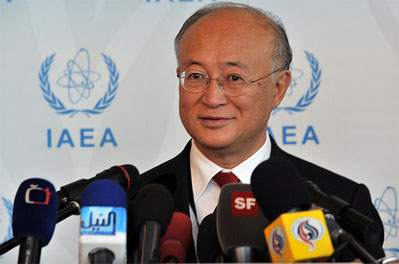This image of Amano precisely captures the ambiguity in Japan’s nuclear posture, namely the paradox whereby Japan often speaks as a moral arbiter on nuclear affairs due to its status as the sole victim of the atomic bomb while being defended by the one of the world’s nuclear powers (and the sole country to use the atomic bomb in wartime). It is particularly ironic that Amano’s election immediately followed revelations by former administrative vice minister for foreign affairs Murata Ryohei about the existence of a “secret” pact between the US and Japan permitting the introduction of US nuclear weapons into Japan without prior consultation.
Murata spoke of a “single sheet of paper,” passed from administrative vice minister to administrative vice minister, which permitted the US to introduce nuclear weapons to Japan without prior consultation with the Japanese government, as was supposed to happen under the terms of a 1960 agreement concluded at the same time as the US-Japan mutual security treaty. Although it was already an open secret that the US introduced nuclear weapons into Japan abroad its warships despite the official bilateral agreement and later three non-nuclear principles (promulgated after the agreement), Murata’s comments mark the first such admission by an administrative vice-minister. (Murata’s remarks were preceded by the remarks of other former administrative vice-ministers last month, who spoke anonymously to Kyodo. Murata is the first on the record.)
Nevertheless, as a testament to how important the Japanese government finds it to downplay Japan’s nuclear paradox before the public, Chief Cabinet Secretary Kawamura Takeo denied the existence of the secret agreement. Kawamura’s denial of reality prompted criticism from Kono Tarō, chairman of the lower house foreign affairs committee, who said that the government’s position contradicted the evidence (and common sense) and suggested that his committee would look into investigating the matter.
Clearing the air on the precise nature of the US-Japan nuclear relationship in the past would be an important first step in debating that relationship going forward. Should Japan formalize the secret agreement and revise the three non-nuclear principles to 2.5 principles, as some have suggested? Would doing so reinforce the nuclear umbrella, or would Japanese elites still voice doubts about the soundness of the US commitment to defend Japan?
Of course, at the same time Amano’s selection as IAEA director-general may rule out major changes in Japan’s nuclear posture for the duration of his term. It seems to me that it would be difficult for Japan to have the nuclear weapons debate desired by conservatives with a Japanese official the face of the global non-proliferation regime. Pressures to have that debate will no dout continue as North Korea and China continue to bolster their arsenals, meaning that rather than resolving Japan’s schizophrenic relationship with the atomic bomb, Amano’s elevation will only intensify the gap between Japan’s aspirations to serve as the world’s conscience on nuclear weapons and the reality of the role of nuclear deterrence in the defense of Japan.


I agree with Tobias Harris. Although Japan could pursue a global non-nuclear strategy as a way of pressuring North Korea to abandon its nuclear weapons, such a policy would contradict Japan’s regional security objectives. Some argue that Japan should introduce American nuclear missiles onto its soil by changing its three non-nuclear principles to make the US nuclear deterrence more credible (just as NATO allies attempted to do in response to the deployment of Soviet SS-20s in the 1980s). I wonder whether Japan, which is ‘a moral arbiter on nuclear affairs’, could really do this kind of thing…
X-posted from shared items
————
This is such an interesting development. I like how Harris paints Japan as being in the middle ground between developed nations and developing nations, where the split involves cracking down on proliferation to new nuclear powers versus reduction of large and established stockpiles.
However, the IAEA plays a large role with worldwide nuclear power as well, and this choice has an effect there as well. Japan’s continued support for nuclear energy and research into nuclear energy is a strong force keeping the power source politically viable IMO.
I’m not sure how much the history of the atomic bombings really plays a role here. Yes, the situation is full of ironies, but I don’t think that distinguishes Japan very much in today’s world. I think the pseudo-pacifist constitution has a more significant role in the perception of Japan as a characteristic non-aggressor.